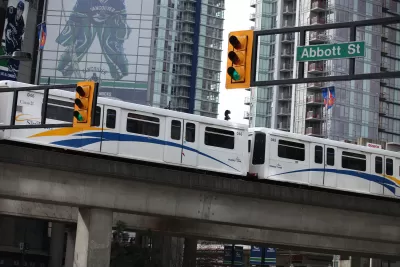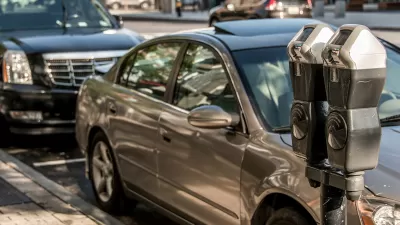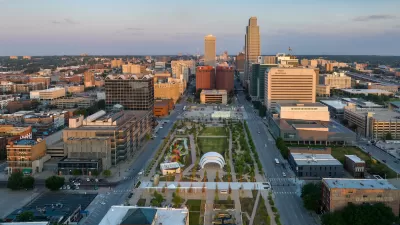Questions about the variables that could significantly alter the future of transportation, and the configuration of the public realm to accommodate those futuristic forms of transportation, illustrate the potential power of scenario planning.

Anthony Flint asks the question: In a time when "new forms of transportation are creating many unknowns," are contemporary streetscape designs fully anticipating the future?
After presenting the example of a development at a prominent corner of Kenmore Square in Boston—a hotel development that "hinges on a complete re-routing of traffic to favor bicyclists and pedestrians, adding big swaths of public space in the process—Flint goes on to pose the significant unknowns challenging all current transportation thinking.
For example, the imminent arrival of autonomous cars may allow narrower streets because driverless cars can essentially tailgate each other. Timed traffic signals, guided by artificial intelligence, will keep things flowing in ways far superior to the red light, green light system of today. Downtowns everywhere won’t have to devote prized urban land for big parking garages or surface lots.
But shared autonomous vehicles may also end up exacerbating Boston’s first-in-the-nation congestion problems. One study predicts that driverless Ubers and Lyfts will be in such continual use, circling the block looking for rides, key streets in major metropolitan areas will see more gridlock than ever before.
Additional technologically advanced mobility mechanisms will also operate in the public realm of the future, like electric scooters and delivery robots. Both are already are already operating in some corners of the United States.
As a tool to anticipate these challenges, Flint suggests scenario planning, described here as allowing planners "to map out multiple scenarios, leaving room for unknowns."
"When conditions on the ground indicate that one of the scenarios is more likely, that’s the trigger for going all-in on infrastructure, policies, and placemaking," according to Flint.
FULL STORY: We’re redesigning our streetscape — but what if we’re getting it all wrong?

Planetizen Federal Action Tracker
A weekly monitor of how Trump’s orders and actions are impacting planners and planning in America.

Maui's Vacation Rental Debate Turns Ugly
Verbal attacks, misinformation campaigns and fistfights plague a high-stakes debate to convert thousands of vacation rentals into long-term housing.

San Francisco Suspends Traffic Calming Amidst Record Deaths
Citing “a challenging fiscal landscape,” the city will cease the program on the heels of 42 traffic deaths, including 24 pedestrians.

Defunct Pittsburgh Power Plant to Become Residential Tower
A decommissioned steam heat plant will be redeveloped into almost 100 affordable housing units.

Trump Prompts Restructuring of Transportation Research Board in “Unprecedented Overreach”
The TRB has eliminated more than half of its committees including those focused on climate, equity, and cities.

Amtrak Rolls Out New Orleans to Alabama “Mardi Gras” Train
The new service will operate morning and evening departures between Mobile and New Orleans.
Urban Design for Planners 1: Software Tools
This six-course series explores essential urban design concepts using open source software and equips planners with the tools they need to participate fully in the urban design process.
Planning for Universal Design
Learn the tools for implementing Universal Design in planning regulations.
Heyer Gruel & Associates PA
JM Goldson LLC
Custer County Colorado
City of Camden Redevelopment Agency
City of Astoria
Transportation Research & Education Center (TREC) at Portland State University
Jefferson Parish Government
Camden Redevelopment Agency
City of Claremont





























